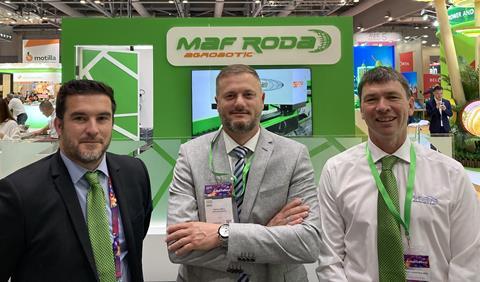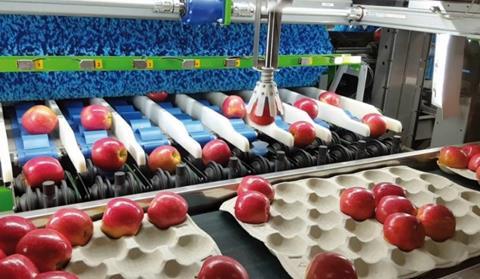MAF Roda’s Vincent Boulbes, export sales manager, Daniel Bourdin, general manager for China, and Chris Bray, New Zealand business development manager, discuss the drivers of automation and the challenges and opportunities in sorting

Chris, what are the key factors driving demand for MAF Roda’s machines in New Zealand?
Chris Bray: Automation is the biggest driver. With labour costs rising and a shortage of workers, particularly during the peak kiwifruit season, automation is no longer optional. Over the last five years, we’ve won nearly 90 per cent of all kiwifruit sorting projects in New Zealand. This year, we have four major projects lined up for the upcoming kiwifruit season, starting towards the end of February. Automation helps offset rising wages and the difficulty in finding workers.
Why is labour becoming such an issue?
CB: Even though packhouses are offering wages up to NZ$50 an hour, they still can’t find enough workers. The physical demands of stacking heavy boxes and working long hours are deterring young people from taking these jobs. Automation offers a reliable, 24/7 solution without the health and safety concerns associated with manual labour.
Damien, how is the situation in China?
Damien Bourdin: It’s similar to New Zealand. Labour costs are rising, and younger generations are less interested in agricultural work. In fact, China now has more robots than all other countries combined. The push for automation in China is not just about cost savings — it’s also about status. Producers want to show off modern, high-tech solutions to their customers. The demand for automation, especially in fruit sorting, is only growing. Automation is essential due to labour shortages, particularly for fruits like cherries and durian, which are labour-intensive and require delicate handling.
What other trends are shaping the fruit sorting industry in China?
DB: China is pushing for self-sufficiency in the production of high-value fruits, like cherries, blueberries and durian, which were previously imported. This shift is driving demand for automation in fruit sorting, especially to handle weather-related issues like heat stress or rain, which can damage delicate fruits. Sorting technology is key to maximising yield and minimising loss.
How are climate challenges affecting the business?
CB: In New Zealand, unpredictable weather — like hail or excessive rain — can cause significant crop damage. Our sorting technology helps identify issues like bruising or hail damage, ensuring only high-quality fruit makes it to market. With climate change, sorting machines are becoming even more essential for ensuring fruit quality during unpredictable weather events.
Vincent Boulbes: China faces similar challenges, with extreme weather conditions damaging crops. Our AI-powered sorting systems are designed to adapt to changing conditions, helping producers sort fruit based on size, defects and moisture content. This technology allows producers to maximise their yield despite environmental stresses.
Can you tell us about MAF Roda’s use of AI in sorting machines?
VB: AI is a key innovation for us. We’re moving beyond traditional sorting methods to integrate AI for more accurate sorting. The AI helps the system recognise fruit defects and adapt to changing environmental conditions, delivering more precise results. This technology reduces human error and helps operators manage complex sorting tasks more efficiently.

What other innovations are you working on?
VB: One major innovation is our water treatment system. We’ve transitioned from traditional sand and UV treatments to ozone treatment, which is much more effective at removing contaminants like fungi that can damage fruit during storage. This technology helps extend the shelf life of fruit, particularly apples, and reduces losses from waterborne contaminants.
We are working on the incorporation of ozone generators into our systems. This new technology is exciting because it can significantly reduce storage loss and tackle issues related to pesticide residues, which can be introduced during washing. We’re still working through regulatory challenges in some countries, but we believe this will have a massive impact.
What are the biggest challenges you’re facing in Europe?
VB: Labour shortages are a major challenge. In the UK, it’s hard to find workers willing to do physically demanding jobs, especially in light of health and safety regulations. So packhouses are turning to automation not just for cost savings but for safety compliance.
Another challenge is the geopolitical situation, particularly the conflicts in Ukraine and the Middle East. Shipping routes have been disrupted, and we’ve had to adjust by relying more heavily on local dealers to service customers.
How are supply chain issues impacting MAF Roda’s operations?
CB: Shipping delays are a big issue. We manufacture a lot of our equipment in France, and shipping from Europe to New Zealand can take 10-12 weeks. With current geopolitical tensions, there are additional delays — vessels now have to go around Africa instead of through the Suez Canal, which adds more time and cost. It’s something we always have to factor in when planning projects in New Zealand.
You’re also expanding into new markets. Can you tell us more?
VB: Yes, we’re targeting the Middle East, particularly countries like Saudi Arabia, Qatar and UAE, where there is strong demand for date sorting solutions. We now have a robust system to sort dates by size, external quality, moisture content. This is a new area for us, but we’re sure our solutions will make an impact.



